The most important thing about getting along with others is being responsible. Without it, projects get stopped, deadlines are missed, and corporate goals go off course. But it’s hard to hold individuals accountable when communication isn’t working, roles aren’t clear, and progress isn’t clear. Modern project management tools fix this problem by making tracking, transparency, and clarity a part of daily work. With tools like Lark that are easy to use, being accountable is less about micromanaging and more about giving teams the structure and visibility they need to succeed.
Lark Base creates visibility into shared responsibilities
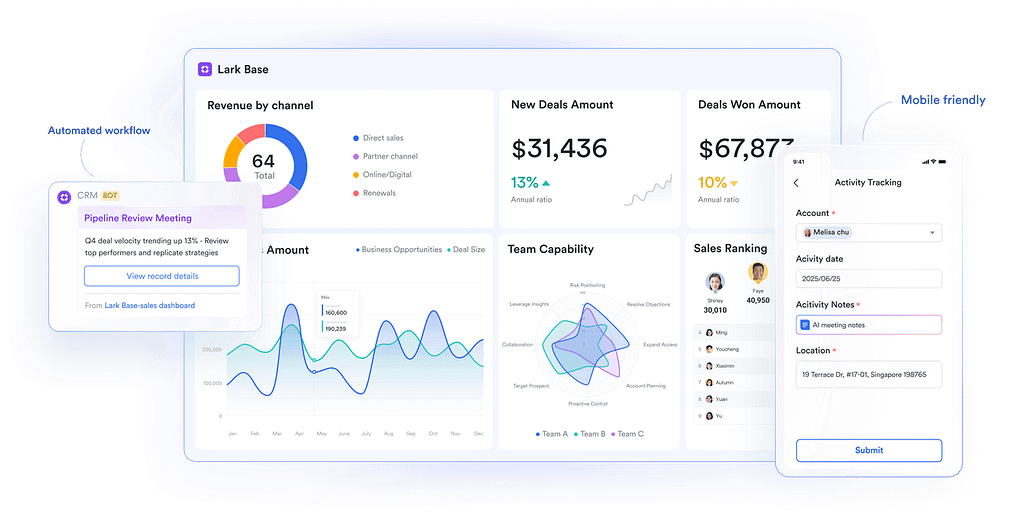
Lark Base
Being responsible means being able to recognize who is in charge of what, when it is due, and how it fits into greater goals. Lark Base puts all of this information onto one customizable platform that everyone working on the projects can see. Kanban boards, Gantt charts, and grid views help teams keep track of what they need to do. Custom fields keep track of key things like budgets, owners, and dependencies. Because records are linked across projects, altering one milestone automatically updates all timelines that are related to it. This keeps everyone up to date. Leaders don’t have to continually give status updates when they have live dashboards that indicate how a project is doing in real time. This shared understanding makes sure that everyone on the team is accountable, not just the managers.
Lark Messenger brings clarity to communication
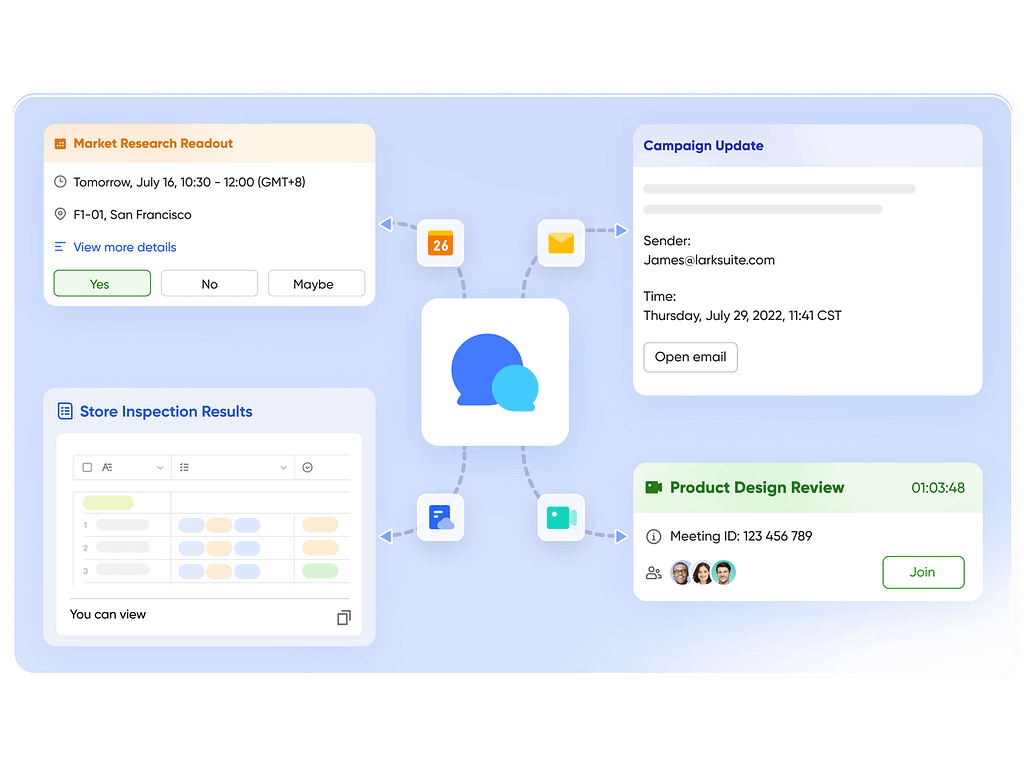
Lark Messenger
A lot of problems with accountability happen when people don’t talk to each other clearly, such when they miss updates, give vague guidance, or forget about promises. Lark Messenger fixes this by making it easy to talk to people and beneficial. Threads keep conversations organized so that updates that are related to each other don’t get buried in a vast chat history. Mentions and reactions make sure that the correct people see and respond to what they are supposed to do. On the other side, pinned messages bring attention to crucial information that shouldn’t be missed. You can make decisions clear and keep them in the workflow by turning conversations into assignments or papers straight immediately. Messenger makes people responsible by being clear, not by watching them. It does this by making communication a way to keep track of things.
Lark Calendar ties accountability to time
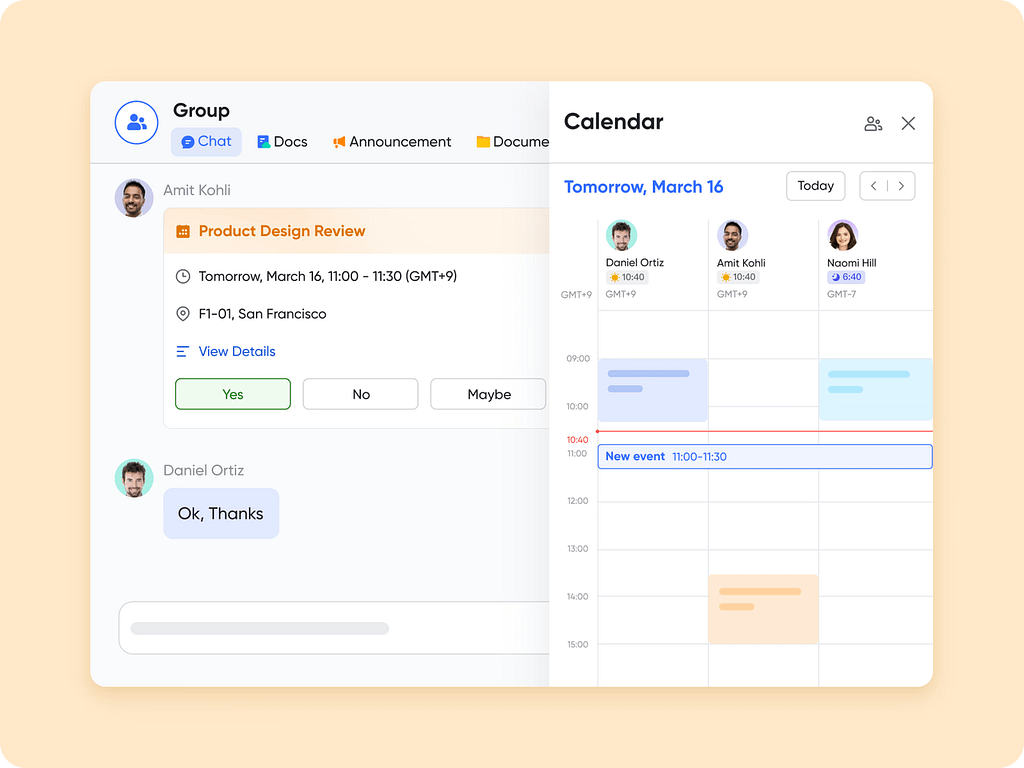
Lark Calendar
Being responsible means meeting deadlines, and Lark Calendar makes sure they are always clear and possible. Automatic changes to time zones make it easier for workers from all over the world to work together, and shared calendars show everyone the critical project milestones. Managers can stack schedules from multiple projects on top of each other to help teams keep track of their tasks and avoid delays. Events can link directly to supporting Docs or Base records. This makes sure that meetings and deadlines are still important. People are more likely to keep their promises if they have reminders and activities that happen on a regular basis. Calendar makes sure that everyone is responsible for matching tasks with time.
Lark Tasks embed accountability into workflows with automation
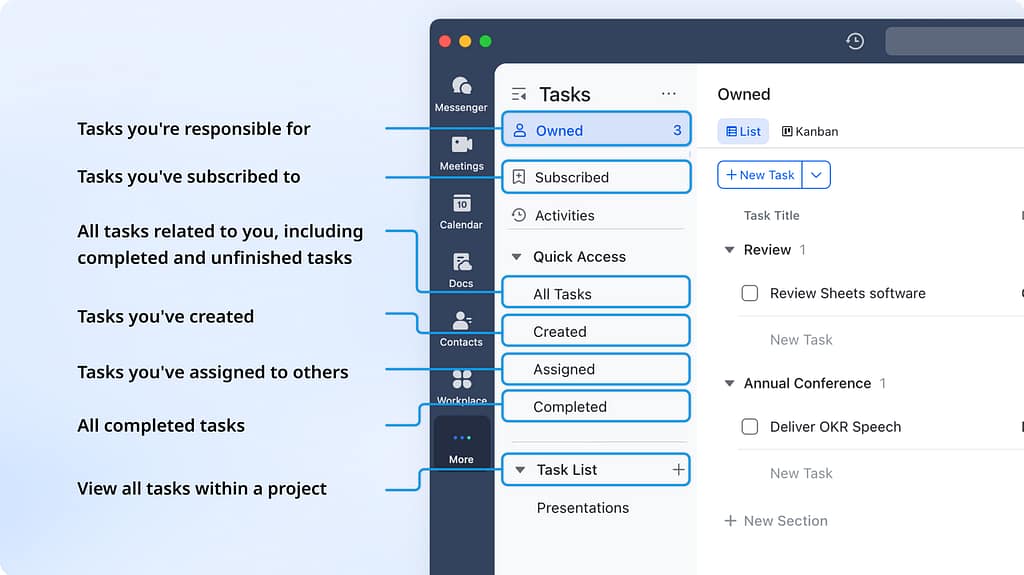
Lark Tasks
When responsibilities aren’t given out correctly or followed up on, accountability breaks down. Lark Tasks makes sure that every task has a due date, an owner, and a mechanism to keep track of progress. Managers may assign tasks immediately from Messenger or meeting notes, so nothing gets missed. Real-time dashboards make it clear to everyone what’s going well and what’s not. Tasks let you set up schedules for things that happen on a regular basis, such weekly reports. This saves time and keeps things the same. Tasks have automated workflow features built in, which is the most important thing. You get automatic reminders, you can tell management about things that are late, and dashboards update on their own. This automation makes workers more responsible, so leaders don’t have to watch everything all the time and can work on other vital things.
Lark Wiki builds accountability into knowledge-sharing
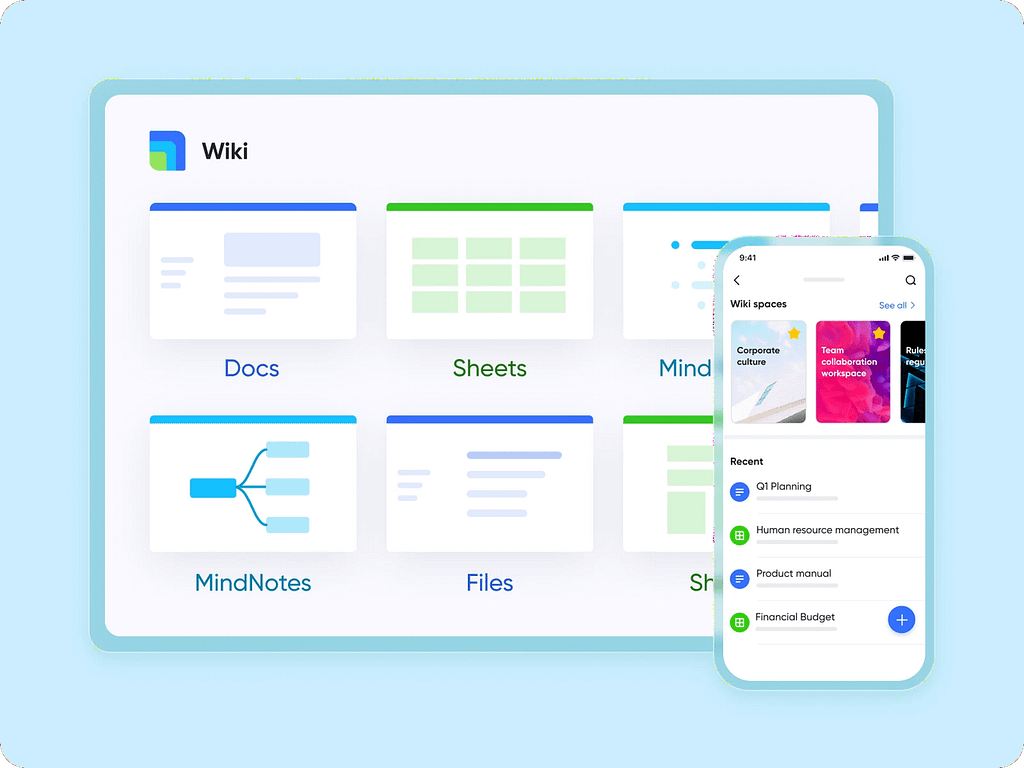
Lark Wiki
Being responsible includes more than just finishing tasks; it also means making sure that information is easy to access and up to date. Lark Wiki is a living source of information where everyone can help keep policies, playbooks, and processes up to date. Teams may arrange parts of papers, tag content, so it’s easy to access, and edit information right away. Search helps workers discover what they need quickly, which cuts down on delays and stops them from repeating the same mistakes over and over again. When information is easy to access and exchange, accountability goes beyond “who is doing the work” to include “how the work is done.” This makes sure that all teams use the same best practices and standards.
Lark Mail reinforces accountability in formal communication
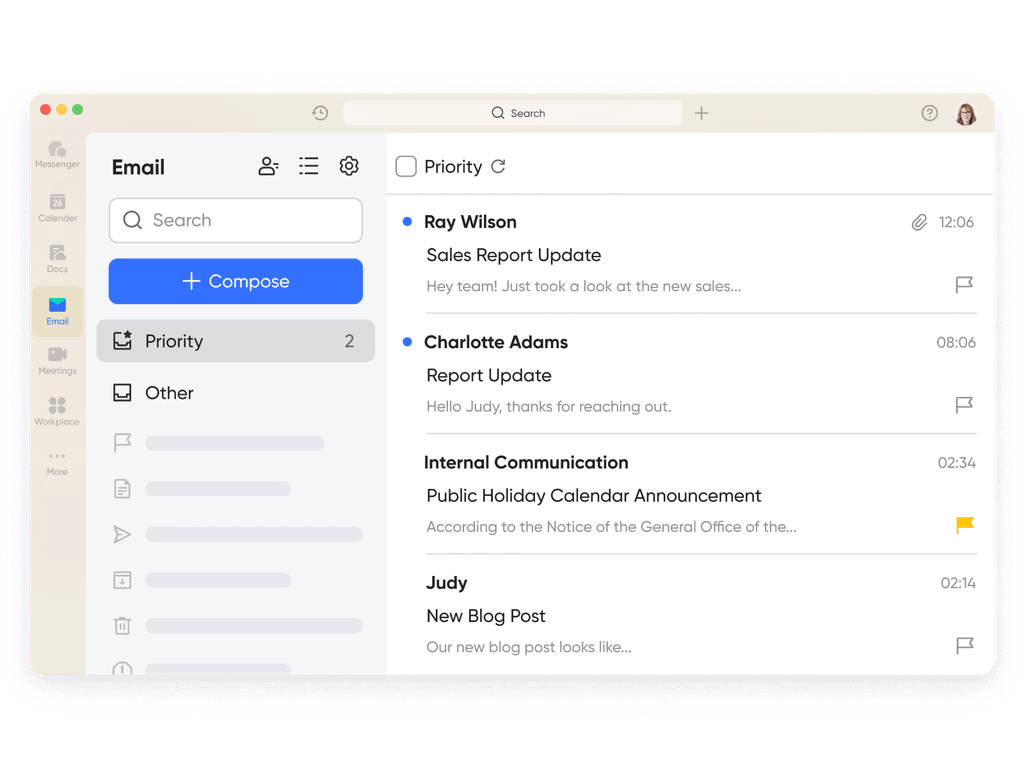
Lark Mail
Chat rooms are wonderful for working together quickly, but email is still the best way to talk to individuals outside of the organization and deliver formal updates. Lark Mail keeps people accountable by introducing this channel to the unified workspace. A single inbox that works on all devices helps teams make sure they don’t miss any essential messages. Gmail sync makes it quick to switch computers, and offline access allows you keep working without stopping. You should know that you can attach emails directly to Docs, tasks, or Base records. This makes sure that essential messages don’t get lost. By integrating email in the same workflow context, Lark Mail makes sure that everyone is responsible, not just internal teams. This includes clients, partners, and other people who have a stake in the business.
Lark OKR connects accountability to performance outcomes
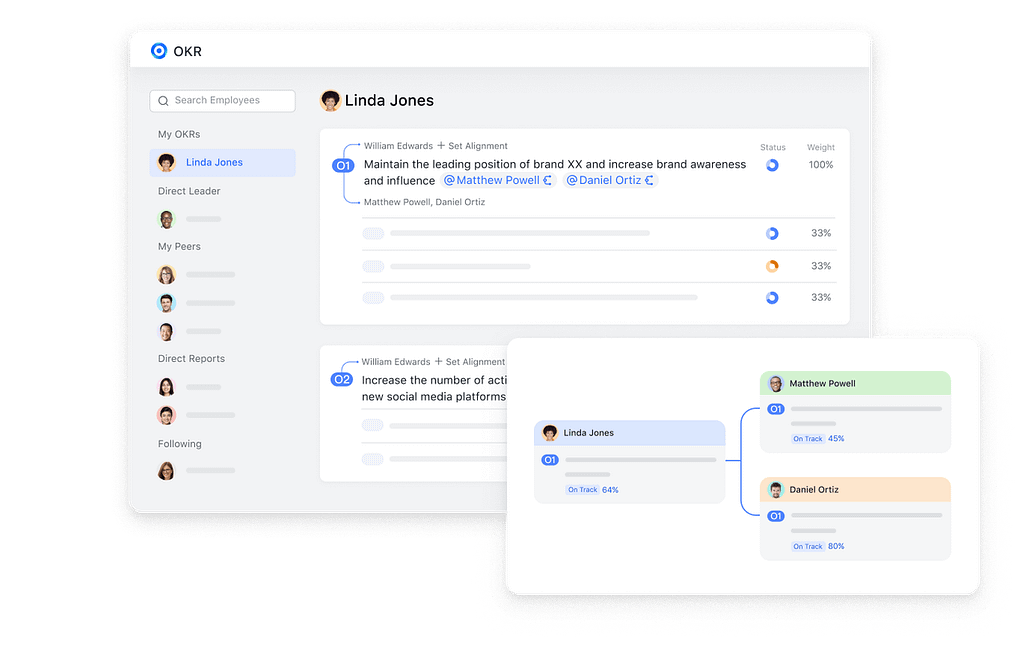
Lark OKR
Being truly responsible means more than just getting things done; it means making a difference. Lark OKR builds this connection by making sure that everyone’s tasks are in line with the company’s goals. Teams can specify key results that can be measured and directly tie them to assignments or projects. This makes sure that the plan and the action are in sync. Dashboards are a simple way to demonstrate progress, so it’s easy to understand how the work of each team aids the overall goals. Employees can provide context by writing comments or making changes, which gets people talking about the results. Leaders can adjust OKRs in the middle of a cycle to keep accountability relevant. This is because priorities change. OKRs convert responsibility from a list of chores to a tool to boost business performance by connecting daily work to measurable outcomes.
Conclusion
Accountability increases when systems make expectations, responsibilities, and outcomes explicit. Lark makes this possible by making it easy to talk to each other, placing all the project information in one place, and automating operations. When teams are disciplined and open, they can do their best job. Base structuring responsibilities, Messenger clearing up conversations, Calendar aligning deadlines, Tasks automating accountability, Wiki keeping standards, Mail strengthening formal communication, and OKRs connecting effort to results. Companies who wish to do better at what they do can use business process management software like Lark. This not only makes responsibility a requirement, but it also makes it an easy part of how teams work.






Leave a Comment